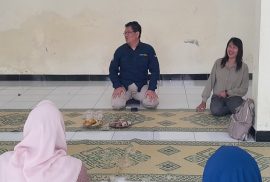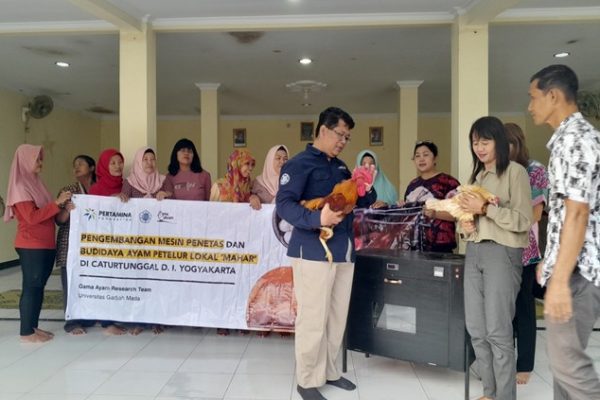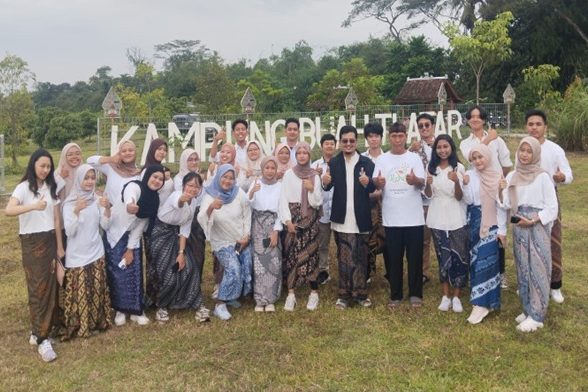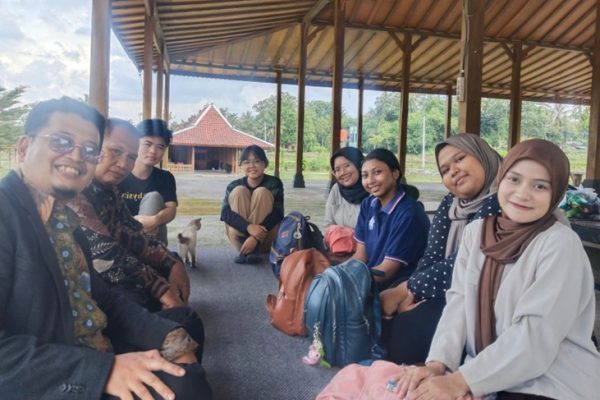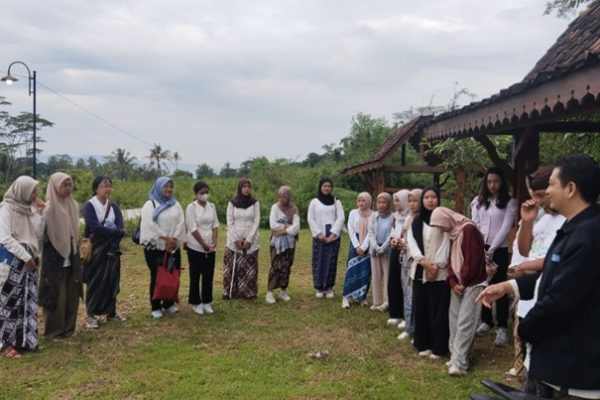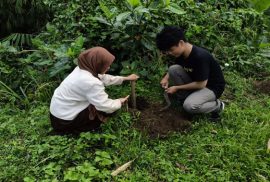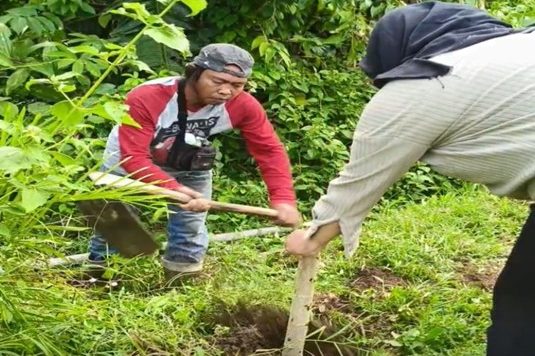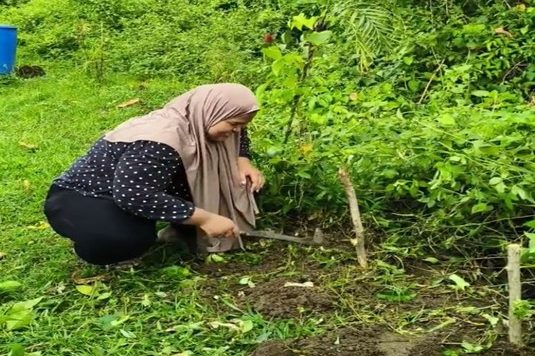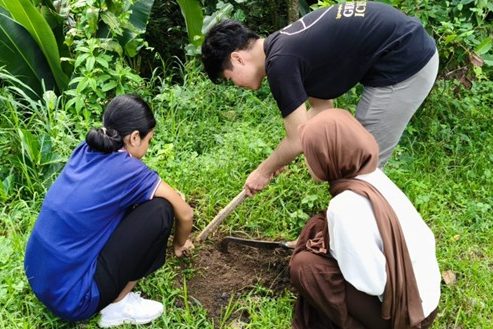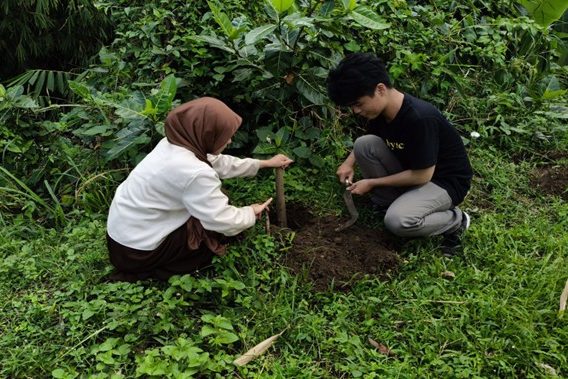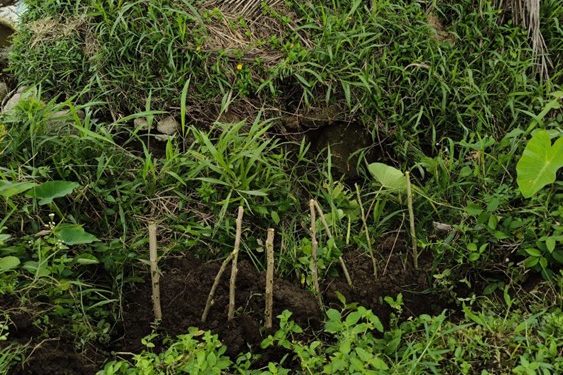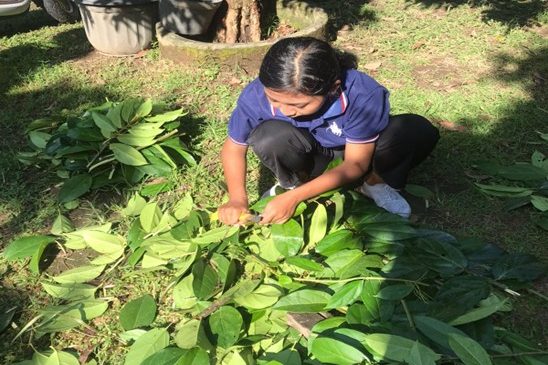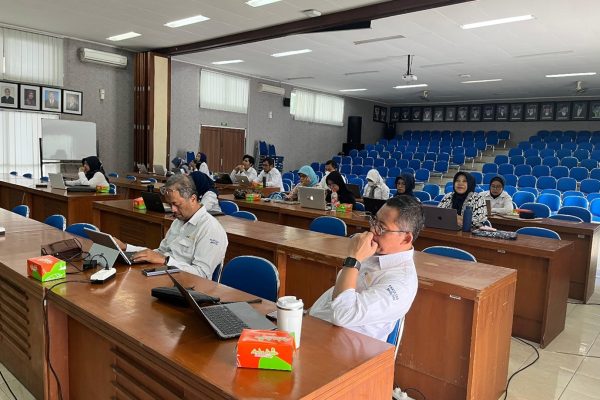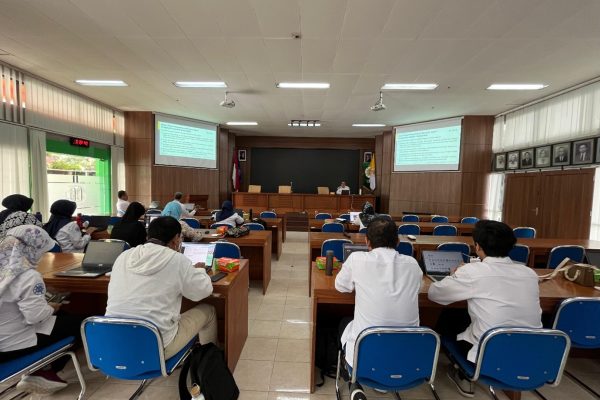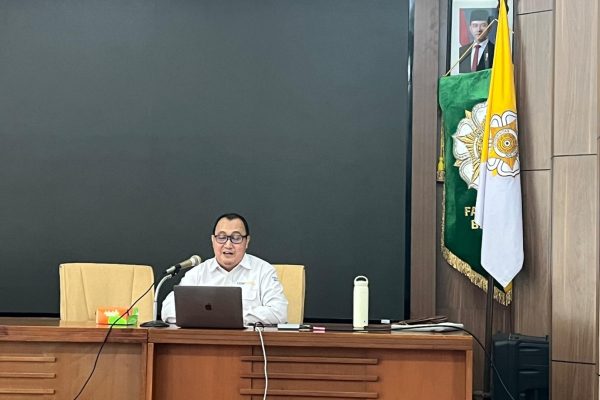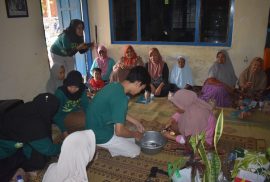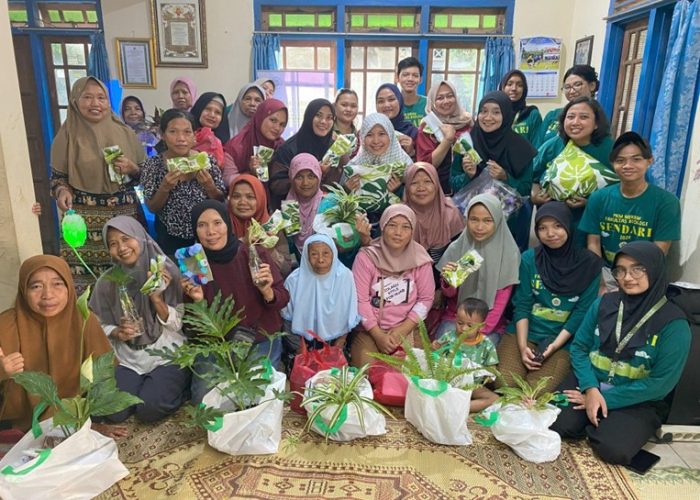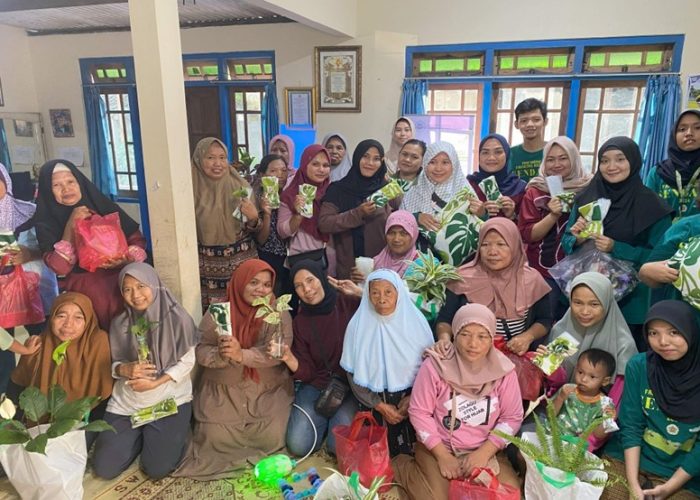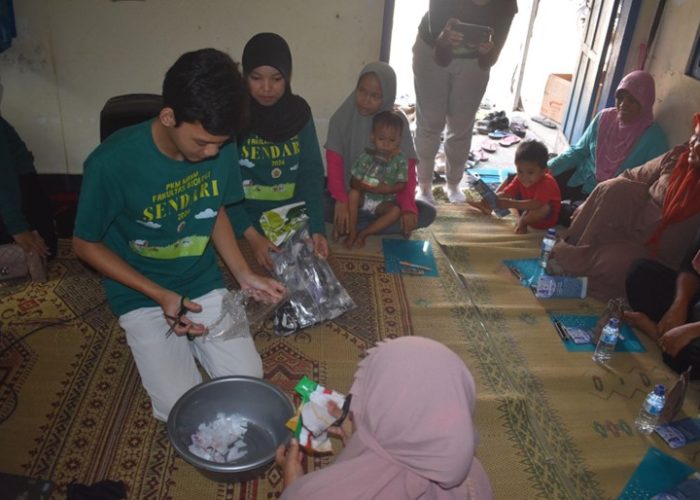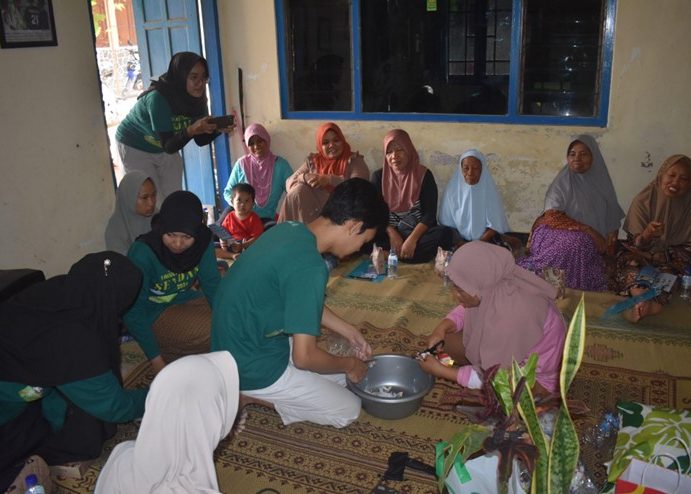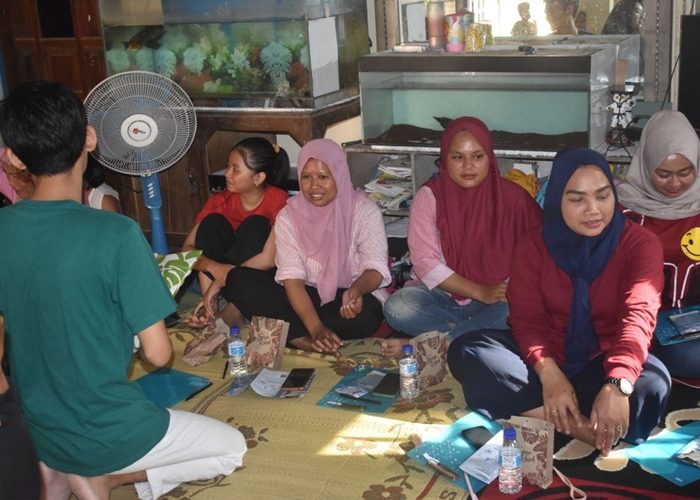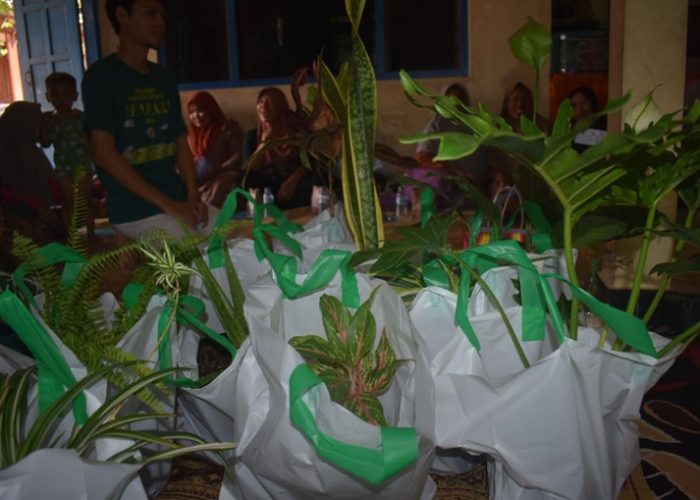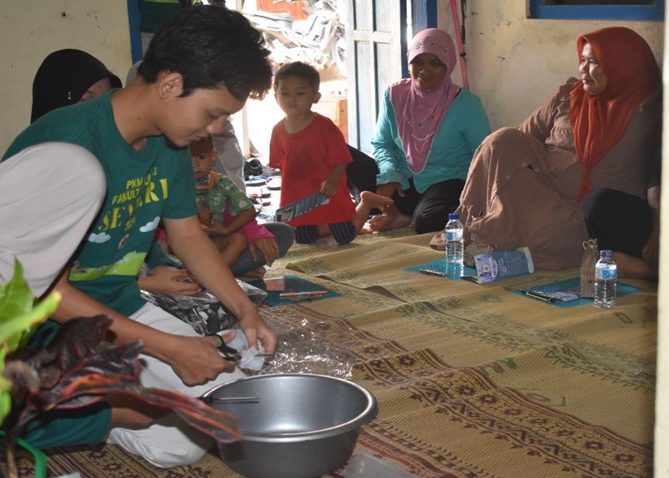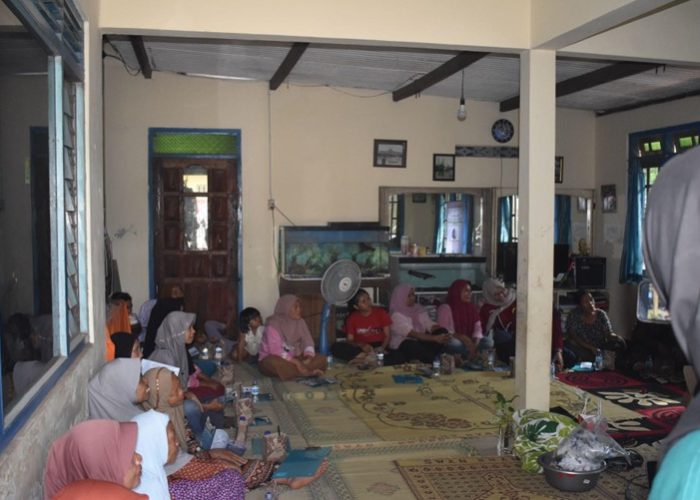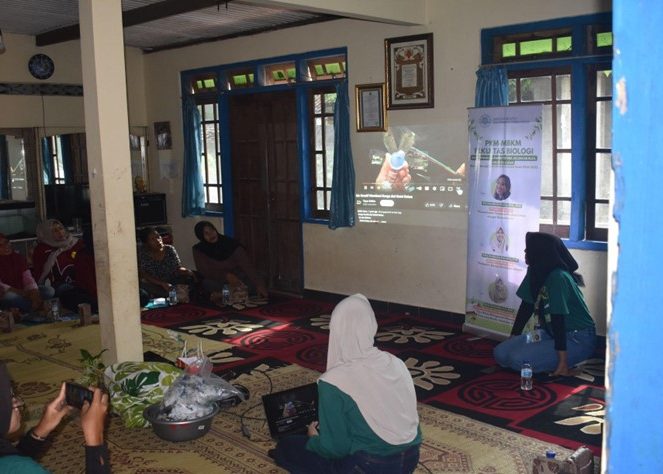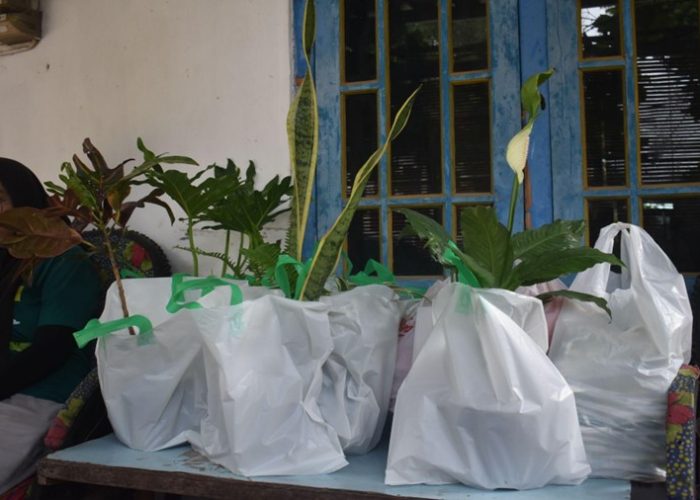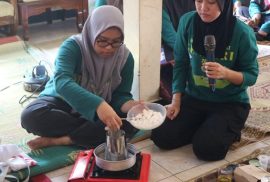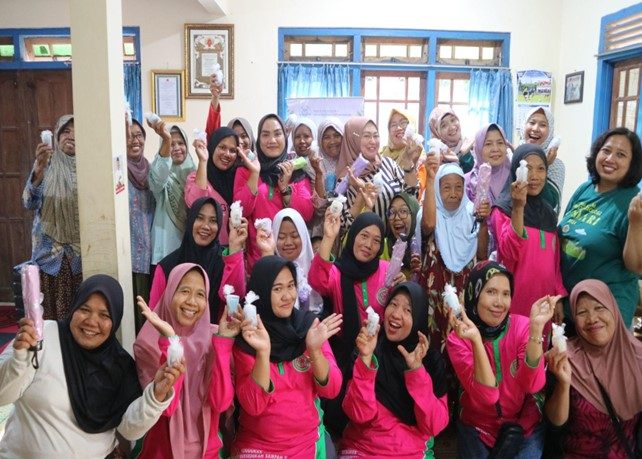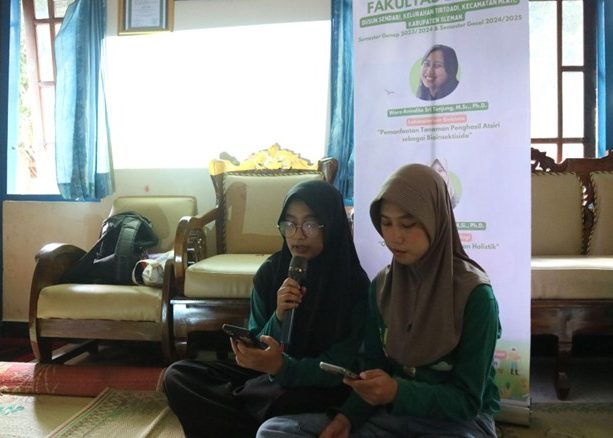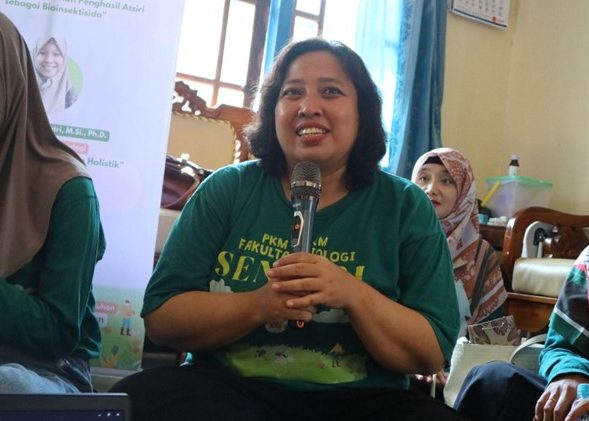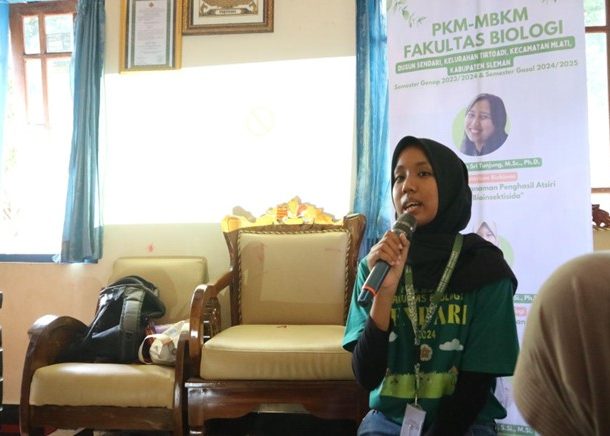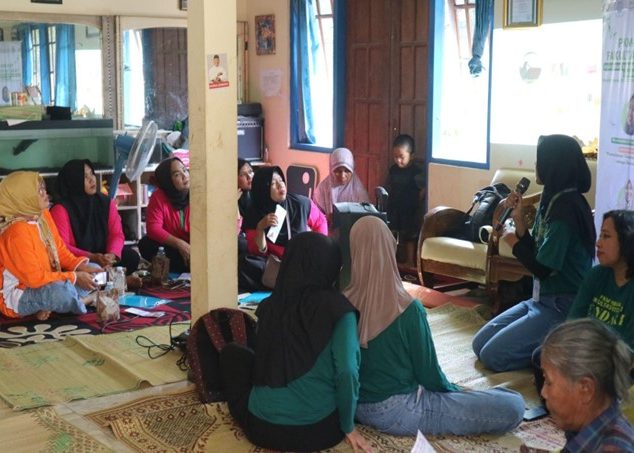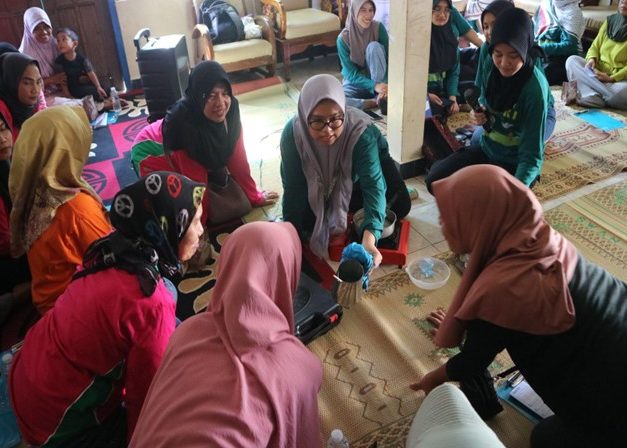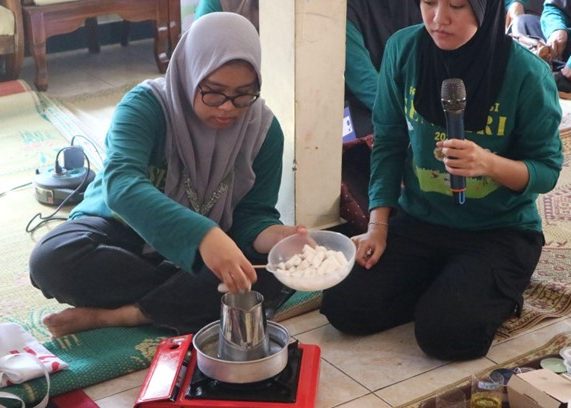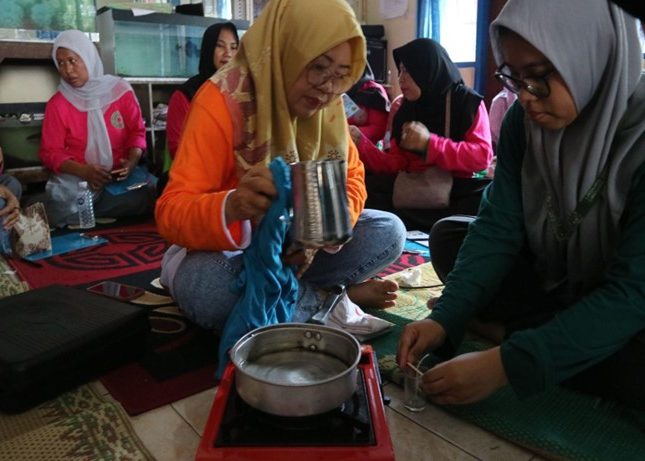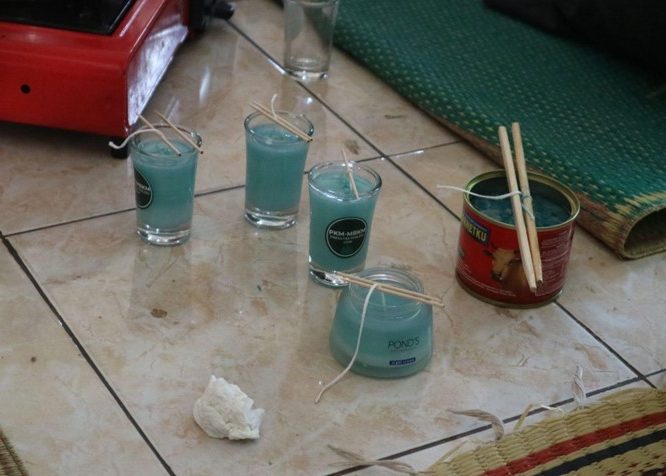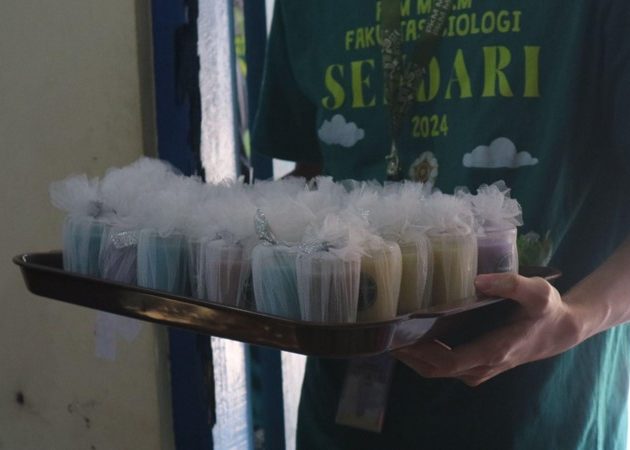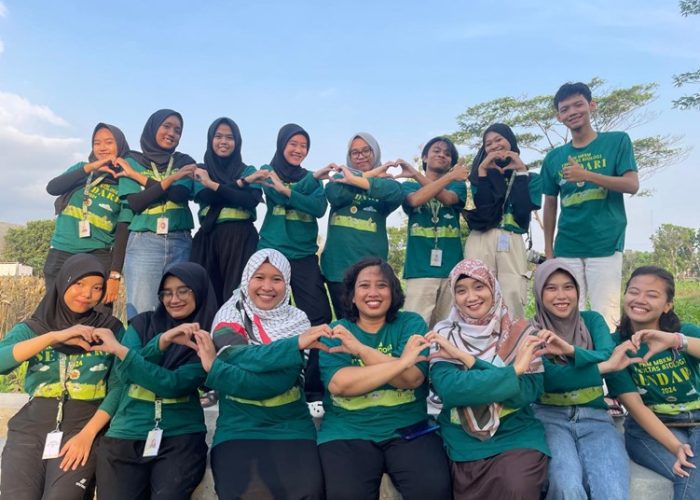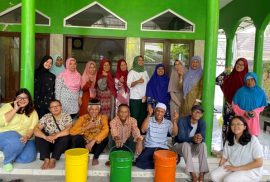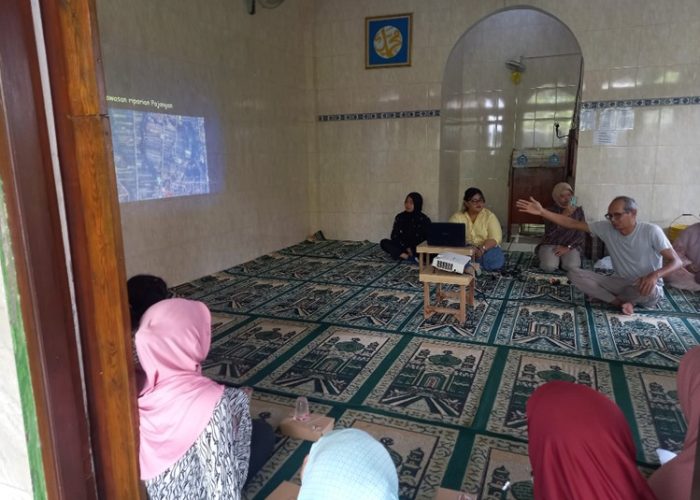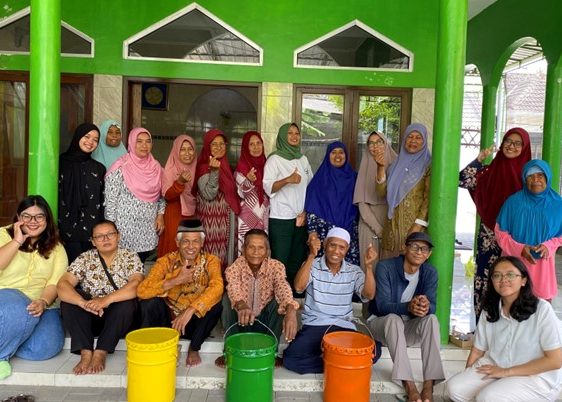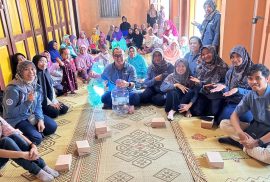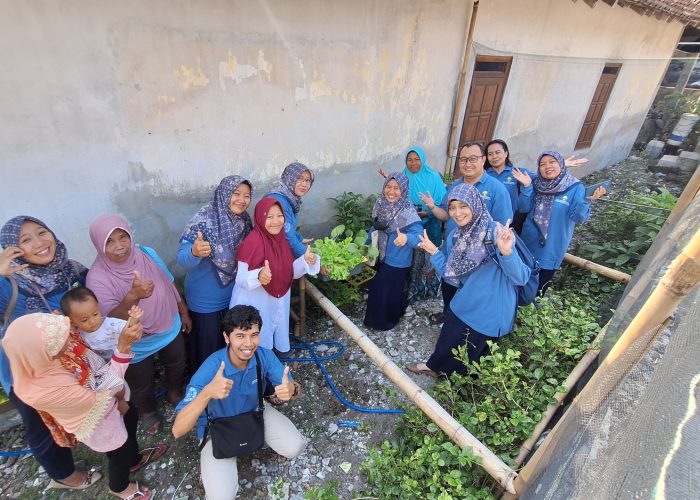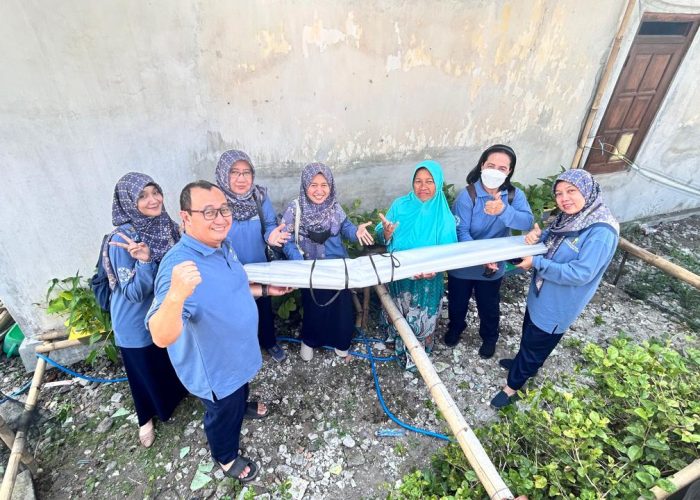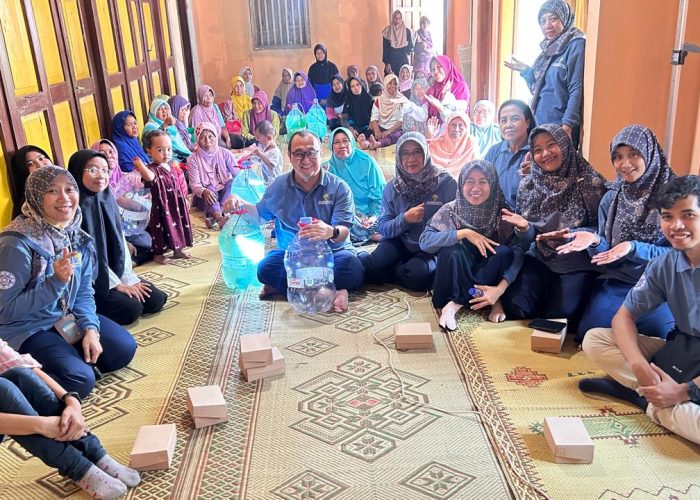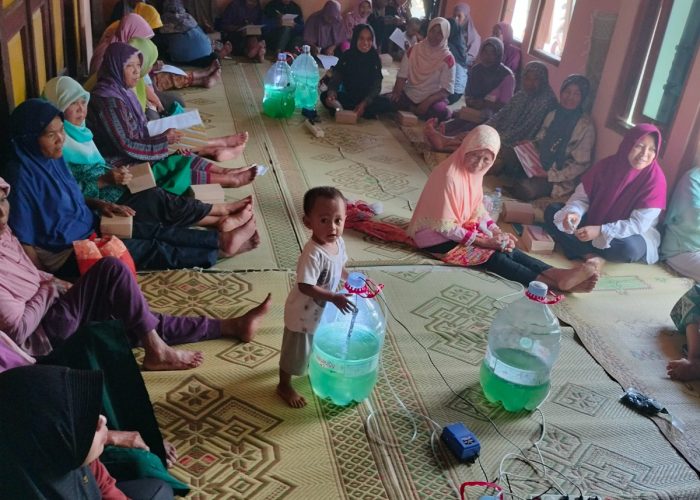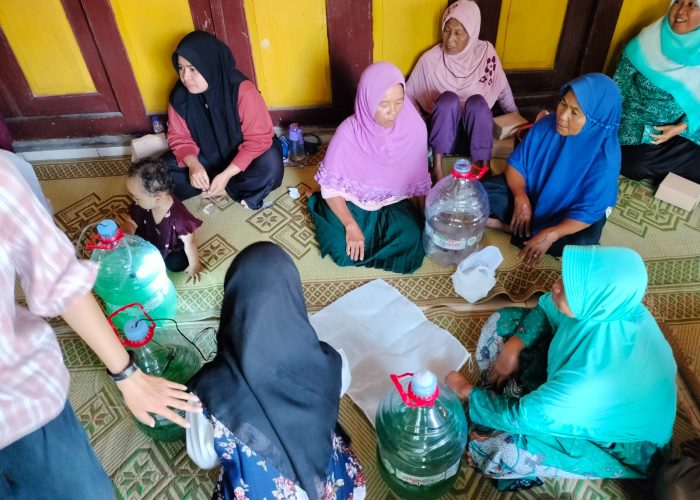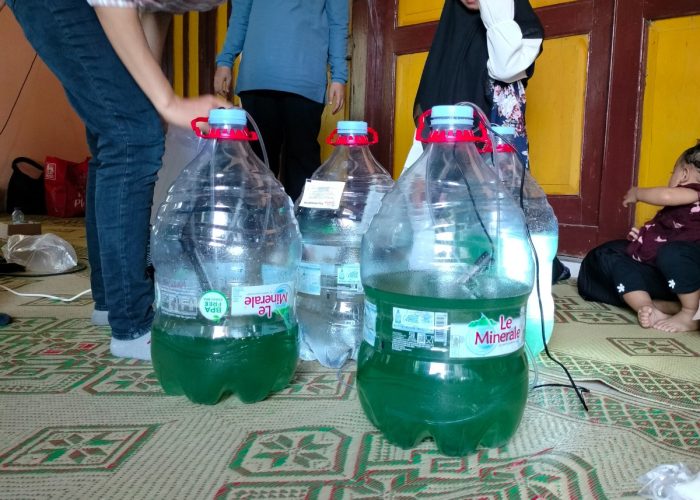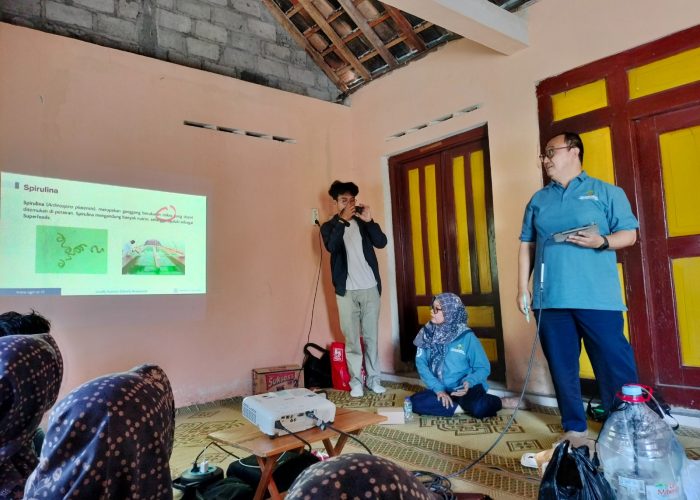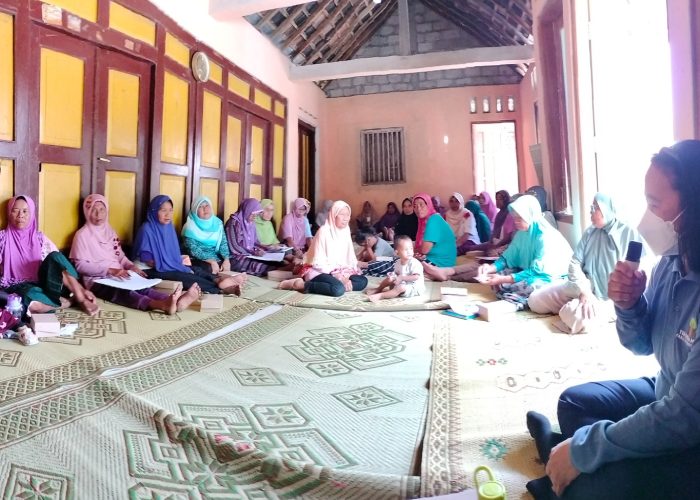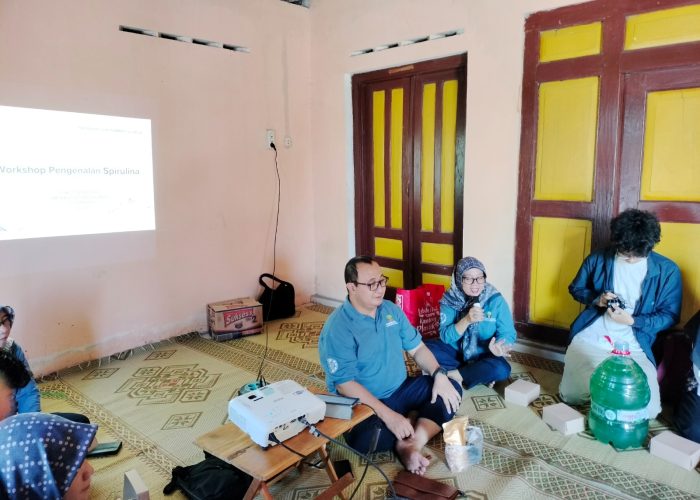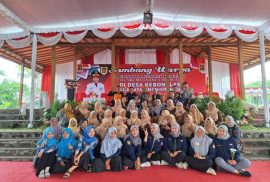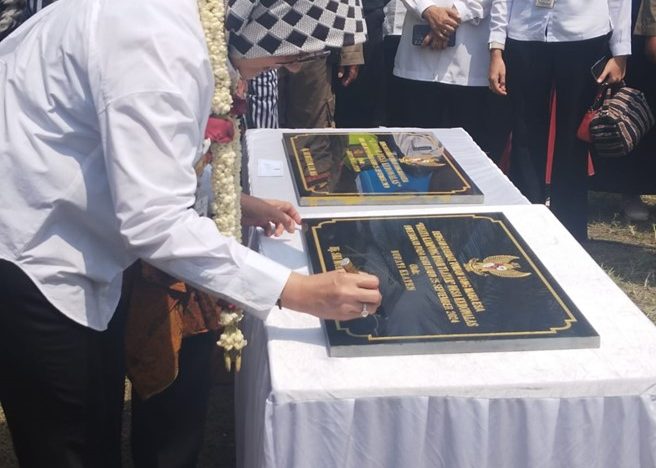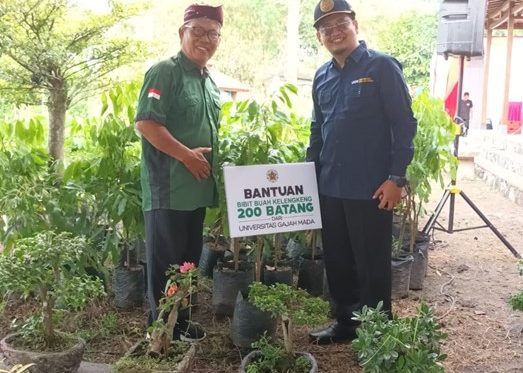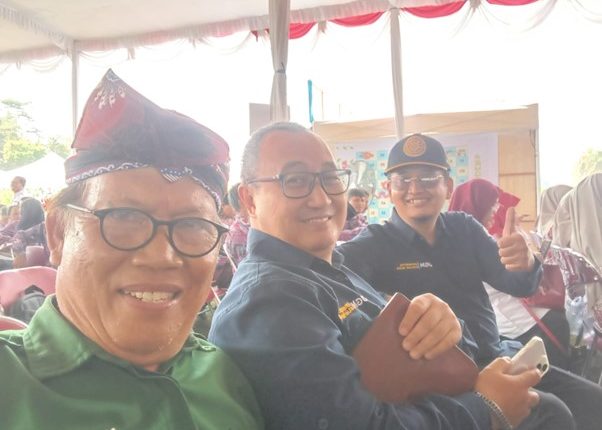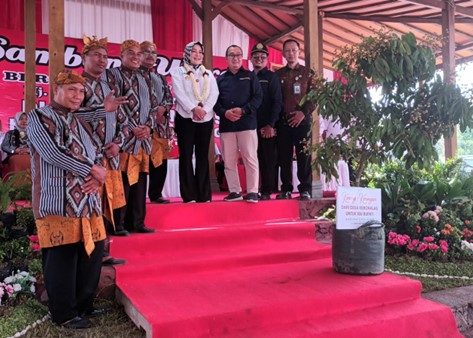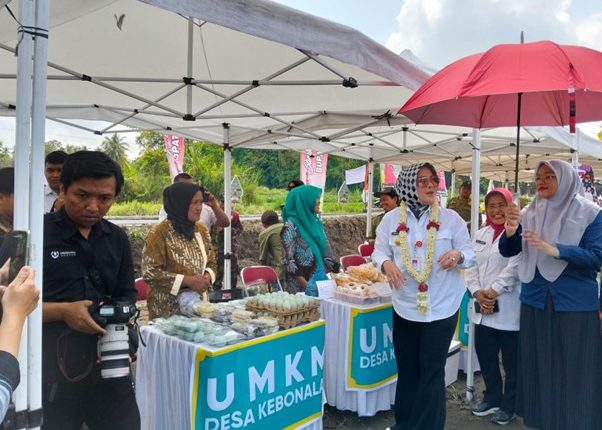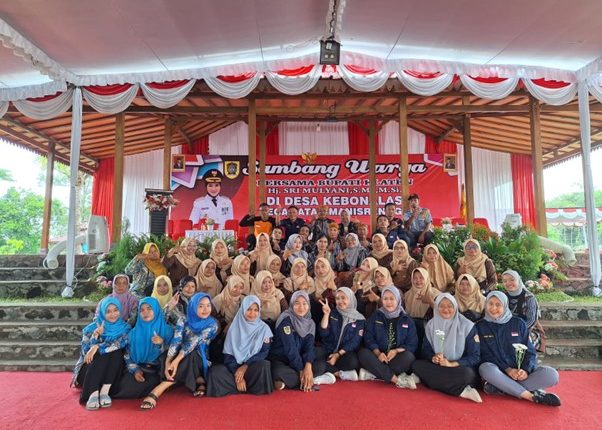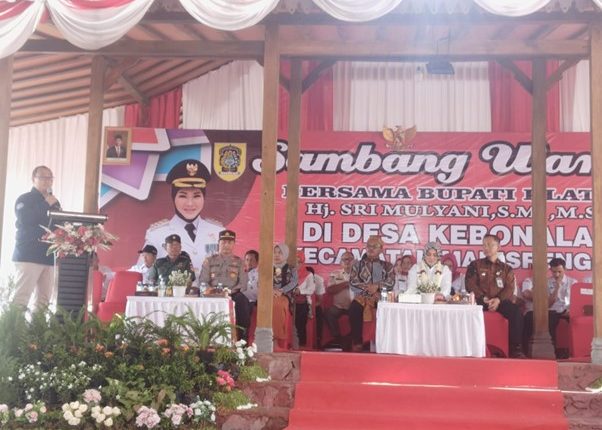Arsip:
SDG 1 : Eliminate Poverty
Yogyakarta, Indonesia – February 19, 2025 – As part of its continued commitment to community empowerment, the GAMA AYAM team has provided an egg incubator and breeding chickens to the Srikandi Women Farmers Group (KWT Srikandi Mrican). This initiative, under the Pertamina Foundation’s PF Sains Implementation Program, aims to accelerate the development of sustainable local chicken farming.
The distribution ceremony was held at the KWT Srikandi Mrican demonstration plot and coincided with the group’s monthly meeting. The symbolic handover was carried out by Prof. Dr. Budi Setiadi Daryono, M.Agr.Sc., on behalf of the GAMA AYAM team, and received by Ms. Nur Handayani, Chair of KWT Srikandi Mrican. Also in attendance were Mr. Heru, a representative of MAHAR chicken breeders from Condong Catur, along with GAMA AYAM team members Dian Sartika, S.Si., M.Sc. and Yusuf Febrianta.
This program is expected to significantly boost chicken farming efforts at the KWT demonstration site. The introduction of incubator technology is a step forward in improving hatch rates and increasing the availability of day-old chicks (DOCs), enhancing the group’s capacity to achieve egg self-sufficiency. This initiative aligns with the Sustainable Development Goals (SDGs), including SDGs No.9: Industry, Innovation, and Infrastructure, through the introduction of scalable agricultural technology; SDGs No.11: Sustainable Cities and Communities, by empowering urban women farmers in productive agriculture; and SDGs No 17: Partnerships for the Goals, by fostering collaboration between GAMA AYAM and KWT Srikandi Mrican. By supporting these SDGs, the partnership contributes to a broader mission of building resilient, self-sufficient communities and a more sustainable world.
On April 13, 2025, students of the Independent Learning Independent Campus (MBKM) Village Development program again demonstrated real contributions in developing the potential of tourism villages through the design of sustainable agriculture-based programs and empowerment of local resources in the tourist destination village of Kabut Kebonalas Manisrenggo Klaten. This discussion activity was carried out by Nurhayati, together with her team, namely Tiara Syifa Wididevani, Putri Ramadhanti, and Mirmastu Lintu Nirmala Wasti, under the guidance of Mr. Sukirno, S.Si., M.Sc., Ph.D. This discussion was carried out directly with Mr. Drs. Suwadi as the the secretary of Kebonalas and also as the Head of POKDARWIS Kabut Kebonalas, as a form of initial collaboration in the implementation of the integrative program between MBKM and KKN PPM UGM for the period June 20–August 2025. This activity also involved Mr. Yousuf Sulaiman, S.IP as a practitioner. The main focus of the program is the management and optimization of the Tlatar Fruit Garden through an educational approach, sustainable agriculture, and innovation based on local biodiversity.
The scope of the program includes greenhouse management as a center for education and production of horticultural plants, especially eggplant and melon plants. In addition, this activity will also provide education related to fertilization techniques and care for starfruit and longan plants. The MBKM program also encourages the use of local plants as alternative food sources, such as cincau leaves and moringa leaves which have the potential to become processed products with high economic value.
This discussion is the first step in preparing for the implementation of KKN with the theme “Optimizing the Potential of Tourism Villages in Manisrenggo through the Integration of Health, Agriculture, and Digitalization in the Development of Local Potential Based on Biodiversity to Support Sustainable Development Goals.” The theme was raised in line with the MBKM program which is oriented towards sustainable agriculture and supports the SDGs for dealing with hunger, SDGs for poverty, SDGs for health, and SDGs for terrestrial ecosystem conservation. Through this program, it is hoped that Kebon Alas Village can become an example of developing an integrated agricultural and health-based tourism village, while also encouraging food independence and improving community welfare through empowering local potential.
On May 12, 2025, students from the Merdeka Belajar Kampus Merdeka program demonstrated their commitment to developing the potential of tourism villages through activities focused on environmental conservation and local food empowerment. This initiative was led by Nurhayati and her team, Mirmastu Lintu Nirmala Wasti, Tiara Syifa Wididevani, and Putri Ramadhanti, with support from Eben Ariesto Purnama Jati and Mazaya Tijani Ulayya, under the supervision of Sukirno, S.Si., M.Sc., Ph.D..
The primary activity involved planting moringa along the riverbanks. This strategic location was chosen to prevent erosion, reinforce the area’s natural boundaries, and create a living fence. Furthermore, the highly nutritious moringa leaves, particularly their protein content, can be processed into vegetables and used as a complementary food source to combat stunting.
In addition, the student team planted black grass jelly seedlings in the Tlatar fruit garden area. The mature grass jelly leaves will serve as raw materials for refreshing and healthy traditional grass jelly drinks, with the aim of bolstering agro-tourism and local culinary offerings in the Kabut Kebonalas area.
This planting initiative garnered considerable support and enthusiasm from local residents, who actively participated in the planting process. This collaboration between students, supervising lecturers, and the village community exemplifies a synergistic approach to building a sustainable, healthy, and self-reliant tourism village.
Through this program, it is envisioned that the Kabut Kebonalas Tourism Village will continue to thrive by prioritizing local values, environmental sustainability, and community food security, thereby contributing to the achievement of the SDGs related to hunger management, poverty reduction, health, and terrestrial ecosystem conservation.
Yogyakarta, Indonesia – November 30, 2024 – In support of national food security initiatives, the ‘GAMA AYAM’ team held a community empowerment program in collaboration with the Srikandi Women Farmers Group (KWT Srikandi) from Mrican, focusing on the application of incubation and farming technology for local laying hens, known as “Mahar.” The event took place in Sawit Sari, Caturtunggal, Yogyakarta, and was supported by the Pertamina Foundation.
This community outreach aimed to introduce sustainable agribusiness practices, share practical knowledge on egg incubation technology, and provide training in local poultry farm management. The “Mahar” chicken breed was chosen for its environmental adaptability, high productivity, and economic potential for small and medium-sized enterprises.
The program was met with great enthusiasm from members of KWT Srikandi, who actively participated in discussions and learning sessions. The event was moderated by Dian Sartika and Prananda Imammuddin Dzaki, with the keynote presentation delivered by Prof. Dr. Budi Setiadi Daryono, M.Agr.Sc., who shared his expertise on local chicken research and the “Mahar” farming system.
An interactive Q&A session followed, marked by high engagement from the participants. The second session featured Mr. Wangdi Wusono, who introduced the design and operation of egg incubators, further deepening participants’ understanding of poultry technology.
The event continued with an energetic break session filled with ice-breaking activities and door prize giveaways, creating a warm and inclusive atmosphere. Participants then visited the GAMA AYAM demonstration coop, where they observed the “Mahar” chickens and gained firsthand experience of the farming environment.
The program concluded with a group photo session and a communal lunch, fostering a sense of unity and shared purpose among participants.
This initiative contributes to the achievement of the United Nations Sustainable Development Goals (SDGs), specifically Goal 8: Decent Work and Economic Growth and Goal 12: Responsible Consumption and Production.
This initiative contributes to the achievement of the United Nations Sustainable Development Goals (SDGs), specifically Goal 8: Decent Work and Economic Growth and Goal 12: Responsible Consumption and Production.
Monday, January 23, 2025 – The Faculty of Biology, Universitas Gadjah Mada (UGM), held a workshop titled “Master Plan for Research and Community Service of the Faculty of Biology 2024-2028”. The event took place from 9:00 AM to 11:00 AM WIB at the Auditorium Biologi Tropika, Faculty of Biology UGM.
The workshop was led by Dr. Eko Agus Suyono, M.App.Sc., Vice Dean for Research, Community Service, Collaboration, and Alumni. In his opening remarks, Dr. Eko emphasized the importance of the Faculty of Biology’s continuous contribution on the global stage.
“Communication and collaboration are the keys to becoming part of the global community. We must also keep up with the dynamic changes in the world,” he said.
“Communication and collaboration are the keys to becoming part of the global community. We must also keep up with the dynamic changes in the world,” he said.
The event was attended by the Dean, Vice Deans, all Heads of Laboratories, and the team of lecturers responsible for drafting the Master Plan for Research and the Master Plan for Community Service at the Faculty of Biology UGM. The workshop covered the fundamentals of master plan development, including the roadmap, development principles, implementation objectives and targets, strategic programs, and performance goals set for 2024–2028.
The Dean of the Faculty of Biology UGM, Prof. Dr. Budi Setiadi Daryono, M.Agr.Sc., also delivered his directives. He highlighted the importance of focusing on performance targets and optimizing available resources.”We must concentrate on achieving our targets and ensure the optimal management of our resources,” Prof. Budi emphasized.
The workshop aimed to develop a strategic plan for the Faculty of Biology UGM for the next five years, aligning with the university’s vision and mission. With this master plan, the Faculty of Biology is expected to enhance its contribution to research and community service, both nationally and internationally.
Yogyakarta, October 26, 2024 – The Community Service Team of the Merdeka Belajar Kampus Merdeka (PkM-MBKM) Program from the 2024 Biology Study Program conducted a community service activity titled “Processing Inorganic Waste and Combating Air Pollution Using Plants” on Saturday, October 26, 2024. Guided by supervising lecturer Mrs. Novita Yustinadiar, S.Si., M.Si., this event aimed to raise community awareness of sustainable inorganic waste management and the utilization of plants to reduce air pollution caused by waste incineration and motor vehicle emissions.
The event began at 2:00 PM WIB with an opening address from Mrs. Novita Yustinadiar, S.Si., M.Si., followed by the main presentation delivered by Aisyah Balqis Febriana. In her session, Aisyah explained that inorganic waste such as plastic, bottles, paper, and cardboard can be sorted and sent to waste banks for recycling, thereby enhancing their utility. Additionally, the concept of waste-to-energy was introduced, specifically the use of waste combustion heat as an environmentally friendly source of electricity, similar to Japan’s use of incineration technology. However, this technology is not yet feasible in Indonesia due to technological limitations. Currently, many people resort to burning waste to eliminate it, which has negative consequences for the environment, health, and society. One example discussed in the session was the production of microplastics from waste burning, which can contaminate soil, water, and air, posing risks to human, animal, and plant health. Thus, raising awareness about the dangers of waste burning and exploring alternative solutions for inorganic waste management is essential. In addition to recycling through waste banks, other potential solutions for managing inorganic waste include creating crafts and upcycling waste into valuable and marketable items. The session also covered air pollution mitigation using plants, including types of plants that absorb air pollution and the mechanisms by which plants reduce pollutants.
Following the presentation, Wisnu Prabowo conducted a hands-on demonstration, showing participants how to make sofa cushions filled with clean, recycled plastic, followed by the distribution of cushion covers and plastic zip covers to all attendees. Then, Ardiah Pramesti Cahyani presented a tutorial video along with a display of creative items made by the student team, such as lanterns from plastic spoons, flowers from plastic bags, flowers from used plastic bottles, frames from bottle caps, flower pots from bottles, and glass bottle vases for water propagation. These creations served as daily-life inspirations for repurposing inorganic waste.
Participants engaged in a Q&A session and took a post-test to assess their understanding of the material. Attractive door prizes, including air-purifying houseplants and other gifts, were awarded to participants who actively engaged in the discussion. The event concluded with a recap video of the PkM-MBKM 2024 program, highlighting the series of environmental education activities.
The program closed with a farewell from Mrs. Novita, a group photo session with all participants and the team, and the distribution of souvenirs as tokens of appreciation. This community service program, which concluded at 4:00 PM WIB, is hoped to provide the community with new insights on environmental preservation through waste management and plant use as a solution for air pollution mitigation. We extend our gratitude to the Faculty of Biology for funding this event through the 2024 PKM-MBKM Grant, hoping it will continue to benefit the broader community.
On Sunday, October 6, 2024, the Community Service Team of the Merdeka Belajar Kampus Merdeka Program (PkM MBKM) from the Faculty of Biology, Universitas Gadjah Mada, conducted a workshop in Dusun Sendari, Sleman, Yogyakarta. The workshop was led by three lecturers, Dr. Woro Anindito Sri Tunjung, M.Si. Novita Yustinadiar, and Dr. Wahyu Aristyaning Putri, along with 12 students. This program supports the Sendari Mandiri initiative, which aims to empower the community to manage their resources independently.
With the theme “Utilizing Recycled Materials and Essential Oils to Create Eco-Friendly Aromatherapy Candles,” the program introduced creative ways to recycle materials, such as unused candles and cooking oil waste, into aromatherapy candles. These candles not only help with relaxation but also serve as natural mosquito repellents. The essential oils used in the candles contain bio-insecticidal properties that can effectively repel mosquitoes while providing a soothing scent that helps reduce stress and create a calming atmosphere at home.
The workshop took place at RT03, RW19 Dusun Sendari, at the residence of Mr. Djijana (RT head) and was attended by 27 members of the local PKK women’s organization. The event began with a pre-test and a group prayer. Annisa Fadhilah, a student member of the PkM MBKM team, explained the process of creating eco-friendly aromatherapy candles using recycled materials such as paraffin wax, used cooking oil, and leftover crayons. The team also explained how to improve the quality of used cooking oil by using activated charcoal to absorb harmful compounds, making it safe for reuse.
During the practical session, Zahra Azkia Razzak and Zahra Fitri Annisa guided participants through the candle-making process from start to finish. Participants were provided with brochures to help them replicate the process at home.
The event concluded with a post-test, the distribution of door prizes in the form of umbrellas to 10 lucky participants, and aromatherapy candles as souvenirs for all attendees. This activity supports the Sustainable Development Goals (SDGs), particularly SDG 3 (Good Health and Well-Being) and SDG 4 (Quality Education).
The 2024 PkM MBKM Biology Faculty program aims to continue raising environmental awareness and empowering communities through sustainable and beneficial activities. With the skills provided, the community of Dusun Sendari is expected to make better use of waste materials, turning them into valuable products while promoting healthier and more environmentally friendly lifestyles.
On October 5, 2024, Mr. Susilohadi, S.Si., M.Si., Ph.D., from the Faculty of Biology, Universitas Gadjah Mada, conducted a socialization on the definition, role, and management of riparian zone, particularly concerning conservation, to the residents of Pajangan Hamlet, Wedomartani, Ngemplak, Sleman, Yogyakarta. This event was part of a series of activities under the 2024 Program Hibah Desa Mitra in Wedomartani Village, Ngemplak, Sleman, Yogyakarta.
The event began with an explanation regarding the definition of a riparian zone. Riparian zones are narrow and elongated areas that act as a transition between aquatic and terrestrial ecosystems. For people living in rural areas, the riparian zone is the only “forest” remaining amidst settlements and rice fields, which occupy nearly 90% of the village area. The role of the riparian zone is crucial, not only as a buffer zone between water and land but also as a carbon sink, erosion preventer, water filter, soil health maintainer, a place for natural vegetation to grow, and a habitat for various wildlife species.
On this occasion, Mr. Susilohadi, S.Si., M.Si., Ph.D., as the speaker, emphasized that the role of riparian zone for the community has become even more important, given that many of these areas are being converted, particularly due to the expansion of housing developers and the emergency state of waste management. In Yogyakarta city and Sleman Regency, environmental crimes such as the uncontrolled disposal of domestic and industrial waste around riparian zones are widespread. This socialization also aligns with SDG (Sustainable Development Goal) number 15, which focuses on the management of terrestrial ecosystems, including specific goals like the protection of protected areas, water flow management, vegetation restoration, wildlife rehabilitation, waste and pollution management, as well as community education and participation. Community participation, especially from Pajangan Hamlet in Wedomartani, in this socialization event was quite large and enthusiastic, particularly with the active involvement of women who participated in discussions about the future of the river and its borders in their village, considering it as part of the local community’s ecosystem.
Monday, September 30 2024, the Community Service team of Wukirsari Village Partner, held its third activity in Wukirsari Village, Kapanewon Cangkringan, Sleman Regency. The activity was opened and guided by Dr. Maryani, M.Sc. which was continued with remarks from the team leader, Mrs. Rina Sri Kasiamdari, S.Si., Ph.D. At this third meeting, Dr. Eko Agus Suyono, S.Sc., M.App.Sc. explained about microalgae with the theme “Introduction to Spirulina: Cultivation and Benefits”. The 35 participants of Sruni village PKK, were told that Spirulina is algae that is very small in size, green in color, spiral-shaped, and can be found in any water body, whether in rivers, seas or ponds. This algae is very rich in nutrients and healthy. Spirulina contains high protein, up to 70%, the same as protein from eggs. Apart from increasing endurance, reducing the risk of diabetes and cholesterol, it can also support children’s growth to avoid stunting. “The harvested products are in the form of powder, such as flour, which can then be made into capsules or various products, and sold at relatively high prices,” said Dr. Eko while showing gallons containing Spirulina culture and samples of Spirulina powder which had been neatly packaged to the participants who were enthusiastic about listening to the presentation. “This powder product can be added directly to various foods: mixed with warm rice, added to soupy foods, or mixed into drinks,” he added.
Dr. Eko also explained how to cultivate Spirulina, namely by mixing the Spirulina starter into clean water and adding fertilizer. Apart from that, by adjusting the pH, providing an aerator connected to a hose, and a lamp, the Spirulina culture can be harvested in around 7-21 days or when the color is bluish green. Harvesting is done by filtering the culture using a nylon filter, then squeezing it until a paste is obtained. Next, the paste is exposed to the sun to dry.
In this activity, a method for cultivating Spirulina was also demonstrated by using unused gallons of mineral water. This session was assisted by students, namely Renata Adaranyssa Egistha Putri, Muhammad Farrel Zharif Zidane, and Finka Aulia. Spirulina starter is mixed with clean water in a 1:1 ratio. Fertilizer, in which the composition is the result of research by the microalgae team under the supervision of Dr. Eko, then added to the culture mixture as a source of nutrients that support the growth of Spirulina. The aerator and light are then installed into the gallon. This culture is grown until it is ready to be harvested when the color is bluish green. Aerators and lights can be periodically turned on and off alternately day or night. This session was then continued with a discussion regarding the material and a quiz with door prizes which increased participants’ enthusiasm in answering questions.
In this third activity, the entire Wukirsari partner village team was involved, namely Prof. Dr. Diah Rachmawati, S.Si., M.Sc., Mrs. Utaminingsih, S.Si., M.Sc., Dr. Aprilia Sufi Subiastuti, S.Si., Dr. Wiko Arif Wibowo, S.Sc., Novita Yustinadiar, S.Si., M.Sc., and Dr. Siti Nurbaiti, S.Si. It is hoped that today’s activity will broaden the knowledge of people who may not know much about microalgae, especially Spirulina. This activity is expected to support the achievement of Indonesia’s Sustainable Development Goals (SDGs), namely Healthy and Prosperous Lives (3); No Hunger (2); No Poverty (1).
After the presentation of the Spirulina theme was finished, the lecturer team and participants went together to the hydroponic planting site, which was the theme that had been presented at the previous meeting. Various plants grown hydroponically, such as kale, lettuce and mustard greens, grow very well and are ready to be harvested. The team from the Faculty of Biology UGM also provided UV plastic for a semi-greenhouse which was initiated by PKK of Sruni Village.
KABUT KEBONALAS Tourism Village, Manisrenggo, Klaten, which was built starting in 2021 and began planting fruit plants together with the MBKM Membangun Desa, Faculty of Biology, UGM (Sukirno, S.Si., M.Sc., Ph.D and Yousuf Soulaeman, S.IP) and since 2022 has entered the first harvest period. In November 2023, the first longan harvest was carried out together with MBKM students, Faculty of Biology, UGM together with POKDARWIS, village government officials, and PKK groups. Then on February 28, 2024, KABUT KEBONALAS together with the MBKM team held a harvest activity and socialization of the tourist destination rides to all MUSPIKA of Manisrenggo District, namely Manisrenggo Sub-district Head Mr. Slamet, S.H., M.Sc., DANRAMIL Manisrenggo Mr. Captain Inf. Sukarman, Manisrenggo Police Chief AKP Fajar Damhudi, S.H., all members of POKDARWIS and elements of Kebonalas Village Government, as well as the ranks of Manisrenggo Teachers and Health Center. This activity involved the Coordinator of the UGM KKN PPM team Muhammad Naufal Dzakwan Luzen and teams from several clusters through the UGM KKN PPM program and the MBKM team Darren Nicholas Rahmanto, Fadilah Rahma Julianty, Joananda Taufik Ardana, and Tamara Sugihara, which then operated in the UGM KKN PPM Program period 2 in 2024 with 30 students with the support of the Directorate of Community Service through the Fostered Village Service program and the UGM KKN Sub directorate through the KKN program.
On September 25, 2024, it was a big momentum for the KABUT KEBONALAS tourist village because it coincided with the Klaten Regent’s Sambang Warga activity, which attend by the head of all departments in Klaten Regency, the village heads in the Regency, the tourist village was inaugurated by Mrs. Hj. Sri Mulyani. “Kampung Buah Tlatar has good potential to be developed as edutourism because it has a good view and prospects to be accompanied by culinary and coffee tourism,” added the Regent in her speech. This activity was opened with a performance of the Edan Edanan Dance and Rampag Kendang from ISI Yogyakarta students. KABUT KEBONALAS is expected to become an integrated tourist vehicle for MSMEs, local culture and arts, foster networking opportunities, and contribute to the economic growth of the community. Then, a symbolic handover of longan fruit plants from the Community Service based on Fostered Village UGM 2024 program and MBKM Membangun Desa of the UGM Faculty of Biology was carried out by Mr. Dr. Eko Agus Suyono, M.App.Sc. as the Vice Dean for Research, Community Service, Cooperation and Alumni who in this case represented the Dean, Mr. Prof. Dr. Budi Setiadi Daryono, M.Agr.Sc. On this occasion, the team handed over two longan plants bearing fruit in 100-liter pots and a total of 250 longan plants to Kebonalas residents. It is hoped that the distribution of these plants can support the KABUT KEBONALAS in the future while empowering the economy of local residents to avoid poverty (SDG1) and create an inclusive, safe, resilient and sustainable community (SDG 11) and to combat climate change (SDG 13).
#SDG 1: Poverty; #SDG 11 Inclusive community; #SDG 13: Climate change; #UGM Biology

